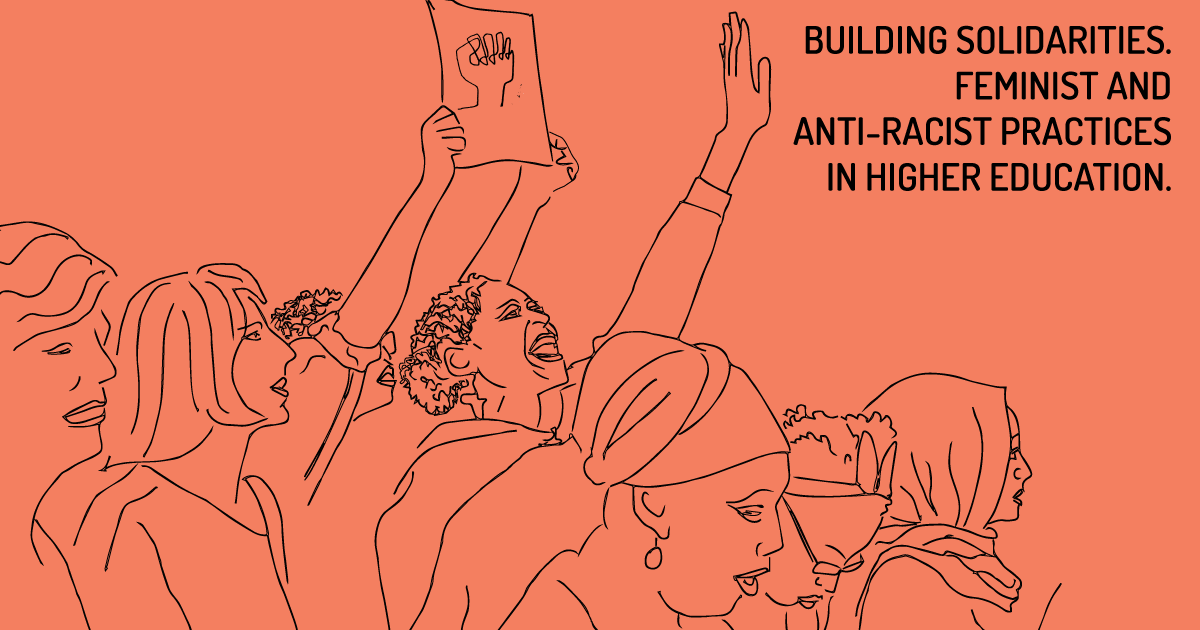BRIDGES Summer School

29 June 2021- 26 July 2021 (completed)
Monday-Thursday, 15:00-18:30 (Timetable below)
Online (if conditions allow, local group meetings may occur)
Free (maintenance and transport to be covered by the participant)
You will need a Miro account
English for international communication (chat translation if needed)
Workload: 75 hours, equivalent to 3 ECTS credits.
Is it possible to decolonize education? How can we diversify the production and reproduction of knowledge? How to transform the university and other learning spaces in order to dismantle structural racism? How to struggle against discrimination within the university from a critical, feminist and intersectional perspective? Which are the everyday practices and mechanisms that, in classrooms, reproduce the social inequalities that also occur outside of them? What pedagogical tools and strategies can we use to produce radical interventions within these spaces?
Through the alliances between various universities and feminist and anti-racist civil society organisations, the Bridges Summer School Building Solidarities – Feminist and Anti-Racist Practices in Higher Education aims at experimenting with, and promoting, feminist and anti-racist pedagies to transform spaces of Higher Education.
- To provide the tools to analyse the mechanisms and conditions of institutional inequality that are produced and reproduced within Higher Education.
- To explore and deepen our undertsanding of key theories, concepts and practices related to anti-racist and feminist struggles.
- To experiment with, and put into practice, pedagogical methods and strategies that challenge racism and discrimination within and outside the classroom.
- To promote participants’ role as agents of change within Higher Education Institutions.
The BRIDGES Summer School is inspired by the Participatory Action Research (PAR) framework of BRIDGES, being facilitated by activists from Higher Education Institutions and Civil Society Organisations. Participants will work collaboratively in online formats (or hybrid, if local contexts’ conditions allow for it). It will take place through synchronous online meetings, asynchronous participation on online platforms, independent learning, and will involve the development of a group project.
Participants will be asked to critically and actively engage with the content previously produced by the BRIDGES consortium, and to develop a group project which would further develop some aspects of the Summer School curriculum. Each group working on a project will be accompanied by local PAR members, who will provide for guidance and support throughout. Each group project will then be presented to the whole group of participants to encourage feedback and mutual learning. Finally, participants will be expected to participate in a collective evaluation of the BRIDGES Summer School, in order to provide feedback that can be incorporated into future versions of the course.
Racism and Other forms of Exclusions in Higher Education: A diagnosis of public policies, daily life in Universities and anti-racist struggles
This block offers an intersectional diagnosis of structural racism in HEI with a particular focus on struggles that aim to decolonise education and a critique to eurocentrism. The discussions will also be organised through a roundtable with representatives from BRIDGES Participatory Action Research groups and activists/representatives from civil society organizations.
Theories as Tools: Feminist anti-racist perspectives and concepts
This block seeks to challenge the ways in which theory is used as a tool of dominant narratives, and to explore how theory can be used as a tool for empowerment and liberation. It comprises discussions on how perception and representation is shaped by hegemonic frames; engaging/experimenting with different ways of seeing, viewing, watching, looking, gazing, and embodying a politics of location in theorising that draws on all of our senses.
Decolonizing Higher Education: Radical pedagogies and epistemologies
This block combines the work of activists both inside and outside academia. It seeks to critically question the power imbalances between academic knowledge and knowledge produced from non-academic perspectives that normally privilege the former. It comprises discussions that depart from embodied experience, as well as from alliance-building practices, as feminist pedagogies. It also proposes to reflect upon the ethical entanglements related with anti-racist pedagogical practice.
| MONDAY | TUESDAY | WEDNESDAY | THURSDAY | FRIDAY | ||
|---|---|---|---|---|---|---|
| June | 28 | 29 | 30 | 1 | 2 | Previous |
| 15:00-16:30 | Meeting
Course Presentation |
Technical Checkup (if needed) |
||||
| 17:00-18:30 | Open Doors 1: Internal selection of the group project |
|||||
| Previous A + B | ||||||
| July | 5 | 6 | 7 | 8 | 9 | 1st week |
| 15:00-16:30 | Slot 1 Theory Workshop: Map |
Slot 3 Academic Carousel |
Slot 4 Crisis as Appearance |
Slot 6 Picnic: Theory Workshop |
||
| 17:00-18:30 | Slot 2 Roundtable |
Slot 5 Photography workshop |
Space of Caring | |||
| Open Space Venue (virtual) | ||||||
| July | 12 | 13 | 14 | 15 | 16 | 2nd week |
| 15:00-16:30 | Slot 8 Pedagogy of the Alliance |
Slot 9 Embodied Theory Workshop |
Transversal Antiracist Tour |
Draft Conversation Groups Presentation |
||
| 17:00-18:30 | Open Doors 2: Meeting groups with facilitators |
Slot 10 Ex. Test Worksheets and the dangers |
Collaborative Assessment of the course | |||
| Open Space Venue (virtual) | ||||||
